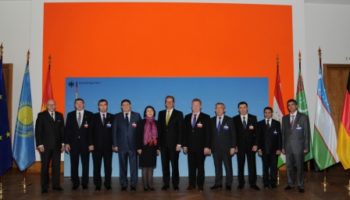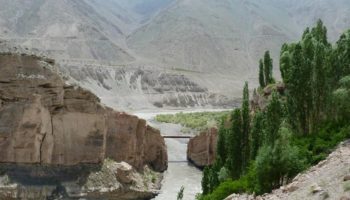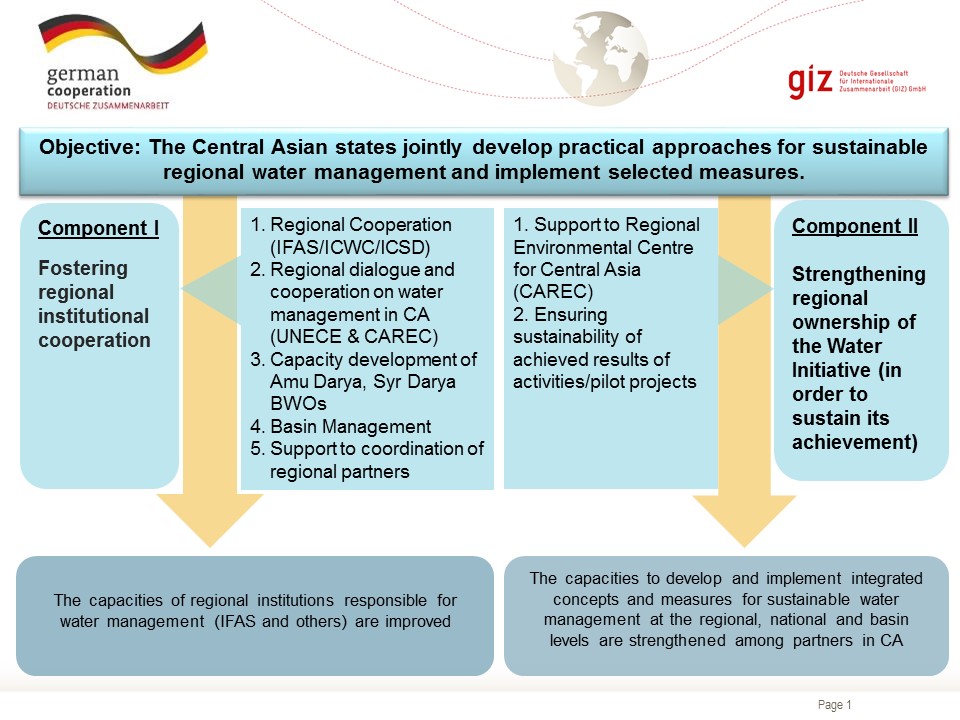A Source of Cooperation – Transboundary Water Management in Central Asia Programme
The most extensive element of the Berlin Process is the Transboundary Water Management in Central Asia Programme, which Deutsche Gesellschaft für Internationale Zusammenarbeit (GIZ) GmbH implements on behalf of the German Federal Foreign Office. Under that programme, measures are being implemented over the period from 2009 to 2014 that not only optimise cooperation in the Central Asian water sector, but also improve the lives of people in the region.
On behalf of the German Federal Foreign Office, the GIZ programme is active in all five Central Asian states and implements measures in the framework of a strategy that was jointly developed with local and regional partner organisations.
The strategy has two components:
Component 1
Fostering regional institutional cooperation

This component focuses on those institutions in Central Asia that regulate matters of water distribution, such as the Interstate Commission for Water Coordination (ICWC) or the International Fund for Saving the Aral Sea (IFAS). The programme aims to strengthen their position in the political system: GIZ and UNECE have analysed legal and institutional conditions that govern the Executive Committee of IFAS (EC IFAS) and, in cooperation with representatives from all five Central Asian states, have drawn up proposals for strengthening EC IFAS as an institution.
EC IFAS and the five states together with GIZ, UNECE and other representatives of the international donor community have developed a comprehensive programme to improve water management within the Aral Sea Basin. This Third Aral Sea Basin Programme (ASPB-3) has been approved by all five Central Asian states.
More information on the Third Aral Sea Basin Programme (ASPB-3) is available here.
GIZ jointly with UNECE aims to continue fostering regional institutional cooperation and support EC IFAS in its task to implement and monitor the Third Aral Sea Basin Programme (ASPB-3) as well as coordinate the engagement by the international donor community.
Component 2
Strengthening transboundary river basin management

This component focuses especially on the smaller transboundary rivers which are particularly suited to applying the basic principles of riverbasin management. In the framework of the EU regional Environmental Programme for Central Asia (EURECA) , GIZ in partnerthip with the Regional Environmental Centre for Central Asia (CAREC) implements measures aimed at strengthening water management organisations, improving human and institutional capacitites for basin planning and supporting (inter-) state administrative basin planning processes as well as exchange of best practices between water management organisations.
These capacity building activities are complemented by selected pilot projects, which serve primarily to implement specific measures at national level that showcase in the most tangible manner the opportunities presented by improved water use. These range from rehabilitating smaller dam safety systems to introducing water saving technologies and reconstructing traditional water supply systems.
Main partners are water management organisations in the Kazakh lower Aral-Syr Darya basin, the Kyrgyz-Tajik Isfara and Khodjabakirgan basins, the Kyrgyz-Uzbek Padshaota basin as well as the Turkmen Murgab basin.
Close coordination with the donor community at large as well as with the other projects under way as a part of the Berlin Process – especially with the Regional Research Network “Central Asian Water” (CAWa) and the German-Kazakh University (DKU) – is pivotal to the programme.



 Русский
Русский







